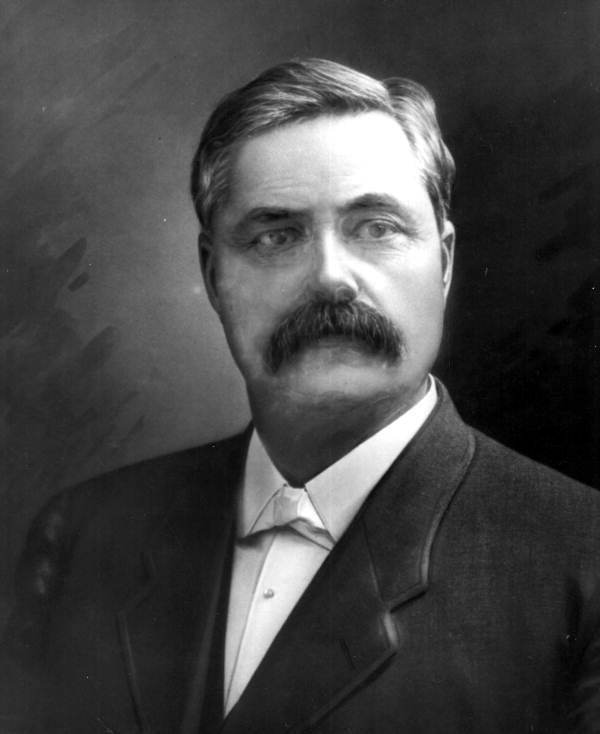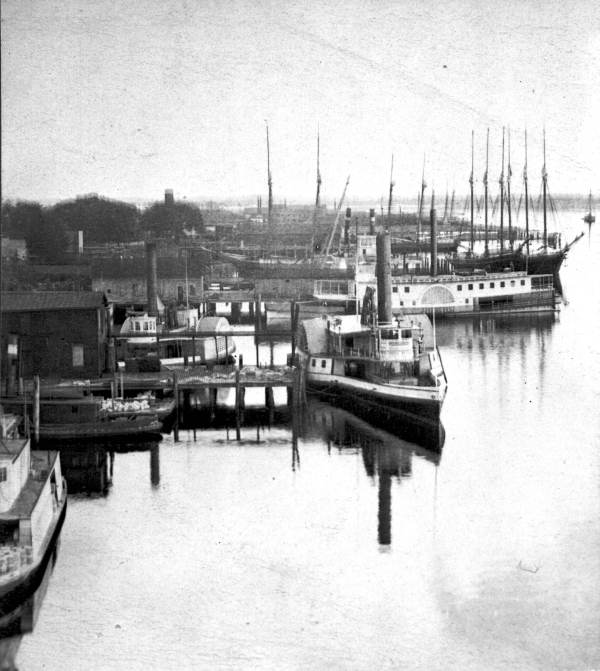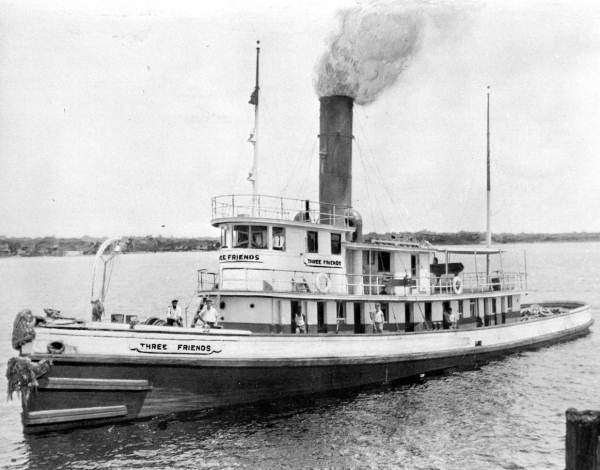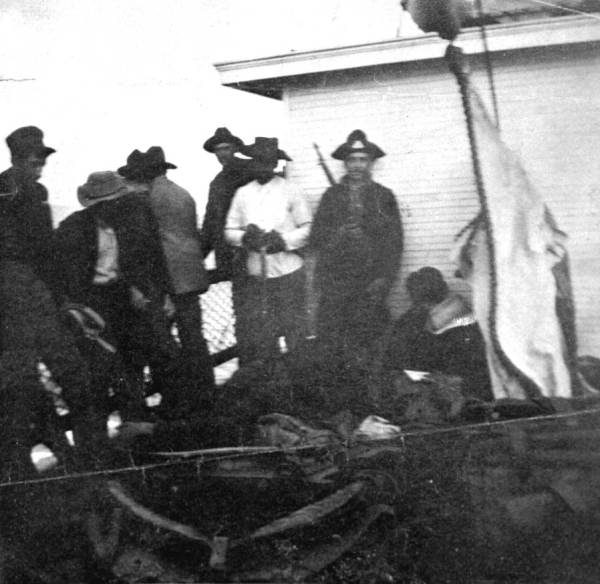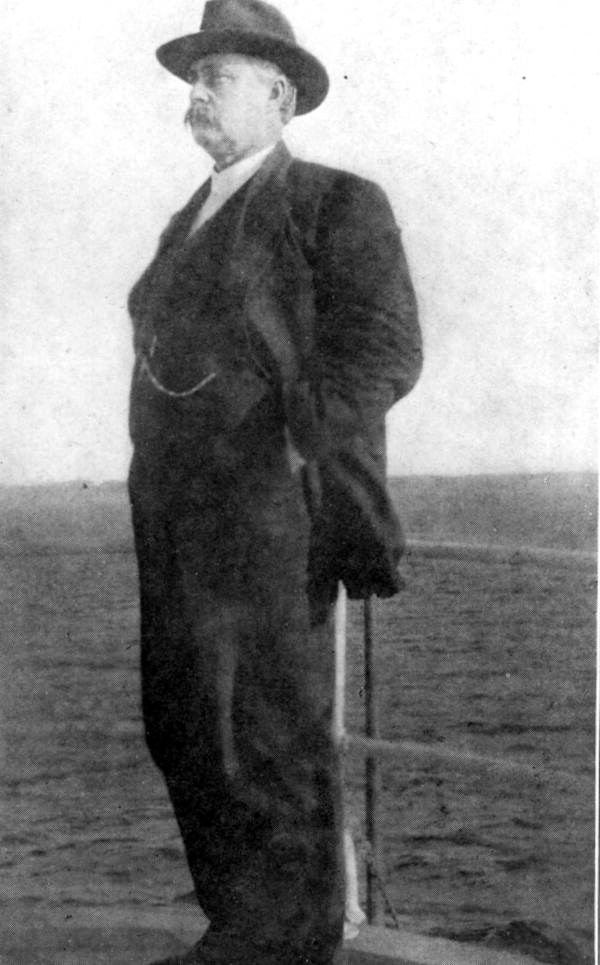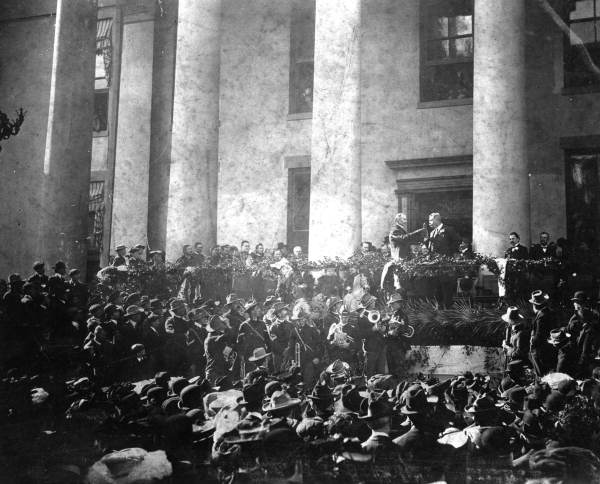Description of previous item
Description of next item
The Unusual Pre-Gubernatorial Career of Governor Broward
Published May 5, 2021 by Florida Memory
Florida’s governors have historically come from a wide variety of backgrounds, especially the earlier ones. Governor Thomas Brown, for example, was a postmaster and a hotelier. Governor Sidney Johnston Catts was a Baptist minister. Perhaps the governor with the most “Floridian” career was Albert Waller Gilchrist, who was an orange grower and real estate salesman. But Florida has one chief executive who was a real jack of all trades in his early days before he entered politics, having been a farm hand, sawmill worker, phosphate miner, steamboat captain and even a filibuster assisting the Cubans in their revolt against Spain in the 1890s. That governor was Napoleon Bonaparte Broward.
Broward’s varied career stemmed in part from the difficult circumstances of his youth. He was born in 1857 in Duval County, but his family moved westward to Hamilton County during the Civil War when Union forces occupied the territory around Jacksonville. The family returned to their plantation after the war ended, but a string of tragedies made the going rough for young Napoleon and his siblings. John Broward, Napoleon’s grandfather and the family patriarch, died in 1865, and Broward’s mother Mary died in 1869 when he was not quite 12 years old. His father, also named Napoleon Bonaparte Broward, fell ill and died the following year. Already destitute from the effects of the war and now orphaned, the Broward children split up. Napoleon’s sisters went to Jacksonville to live with aunts while he and his younger brother Montcalm stayed behind to try to run the family farm on their own.
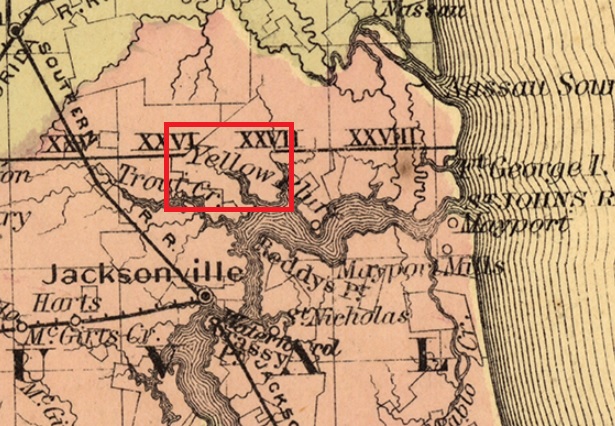
Excerpt of Colton's 1868 map of Florida showing the location of the Broward family homestead. The waterway fronting the property was originally caled Cedar Creek, but the wider downriver portion has more recently been known as the Broward River. Click or tap the image to view a zoomable version of the complete map.
For two years, Napoleon and Montcalm Broward tended their crops as though they were adult farmers, relatives occasionally visiting to see how they were getting along. Determined as they were, the boys were unable to keep the farm going, and in 1871 they went to work at a logging camp run by their uncle. They earned their keep by piloting large rafts of sawed logs as they made their way down the St. Johns River to a sawmill for processing. After two years of this adventurous work, the brothers moved to the farm of their maternal grandfather, Amander Parsons, and worked for two years while also attending a few classes at a public school in the Mill Cove community.
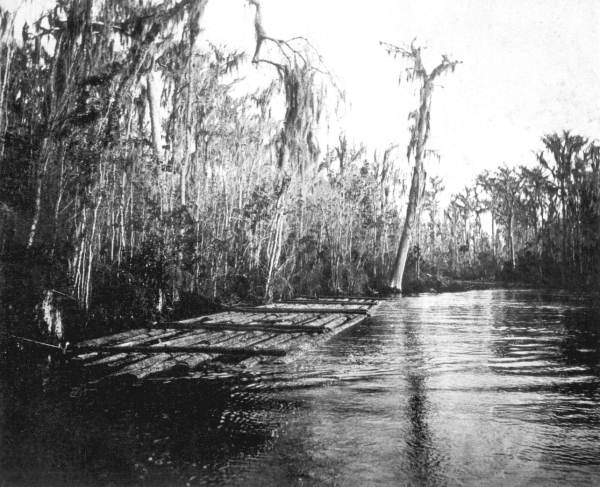
Raft of cypress logs on the Oklawaha River (1892). The raft manned by the Broward brothers would have been similar.
Death once again upended young Napoleon’s life when his grandfather Parsons died in 1873. He took a job aboard a steamboat—the first of many—serving as a cook and assistant fireman for his uncle, Captain Joseph Parsons. He worked on the boat in the summer months and attended a public school north of Jacksonville at New Berlin during the winters. Broward discovered he was well-suited for working aboard a ship, and soon he was en route to New England, where he found work on a commercial fishing schooner based out of Cape Cod, Massachusetts.
By the time Napoleon Bonaparte Broward returned to Florida in 1878, he had grown both physically and mentally. He was over six feet tall, weighed 200 pounds, and had literally learned the ropes for handling a ship. He quickly put his new skills to work in a string of jobs on steamboats plying the St. Johns River, eventually acquiring part ownership in one such vessel, the Kate Spencer.
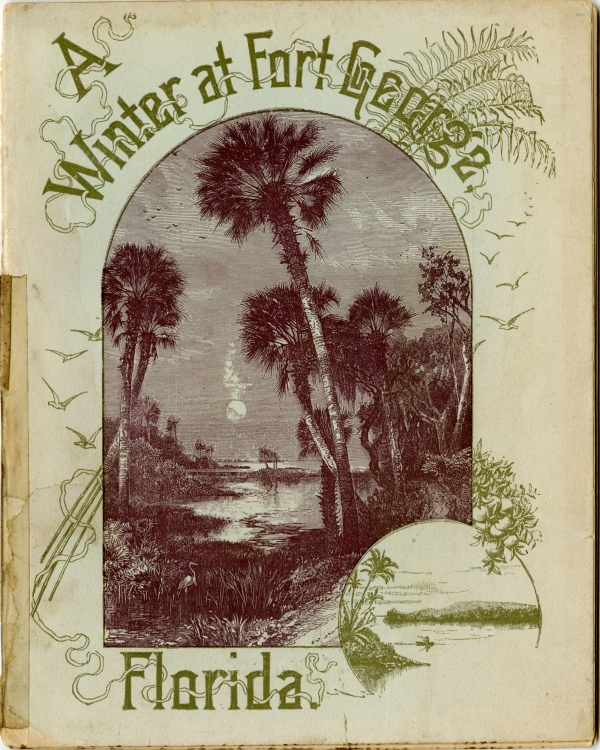
Pamphlet advertising proposed developments at Fort George Island near the mouth of the St. Johns River (ca. 1888). Broward's Kate Spencer transported goods and passengers to and from this island in the 1890s.
Life on the river earned Broward a living and popularity with the locals, but it also brought him love. In 1883, he married Georgina Carolina Kemps, the daughter of one of his employers, Captain David Kemps. The newly married couple had a child later that year, but Carrie died shortly after the birth and the baby, Napoleon Bonaparte Broward, Jr., only lived a few weeks. The elder Broward grieved for his lost wife and child, but in time he found love on the river once again—this time a passenger aboard the Kate Spencer.
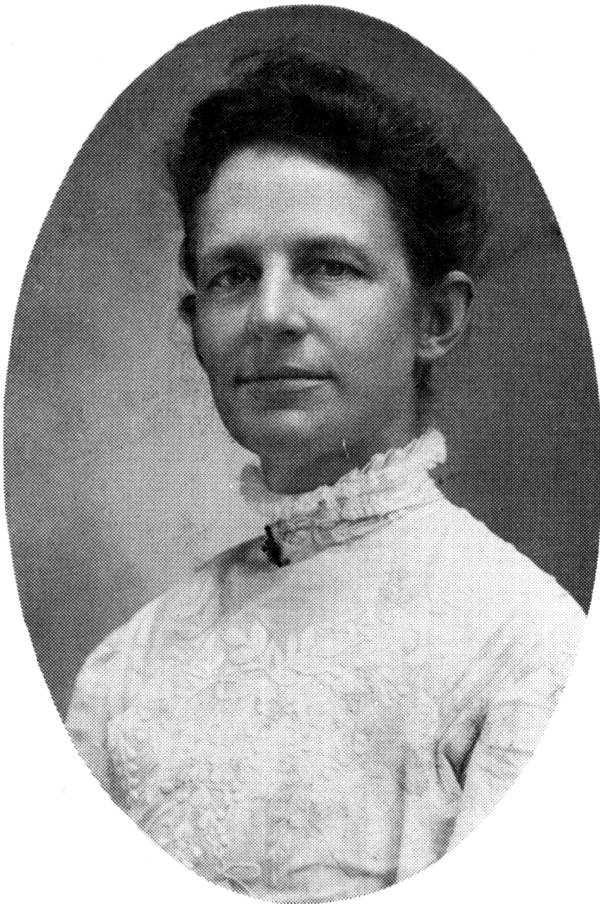
Portrait of Annie Douglass Broward, who would serve as Florida's first lady from 1905 to 1909 (photo ca. 1905).
That passenger, Miss Annie Douglass, did not have a very high opinion of the Kate Spencer or its captain at that time. A friend of hers had tried to board the boat some time beforehand, and the captain apparently didn’t see him and left him behind. Broward apologized to Miss Douglass and explained that he had not been aboard the boat that day and one of his associates had made the error. The lady replied that if a captain wanted to take a holiday he ought to have a substitute who knew what he was doing. The ill feeling between Broward and Annie Douglass couldn’t have been too strong, however, because they were married on May 5, 1887 at the Newnan Street Presbyterian Church.
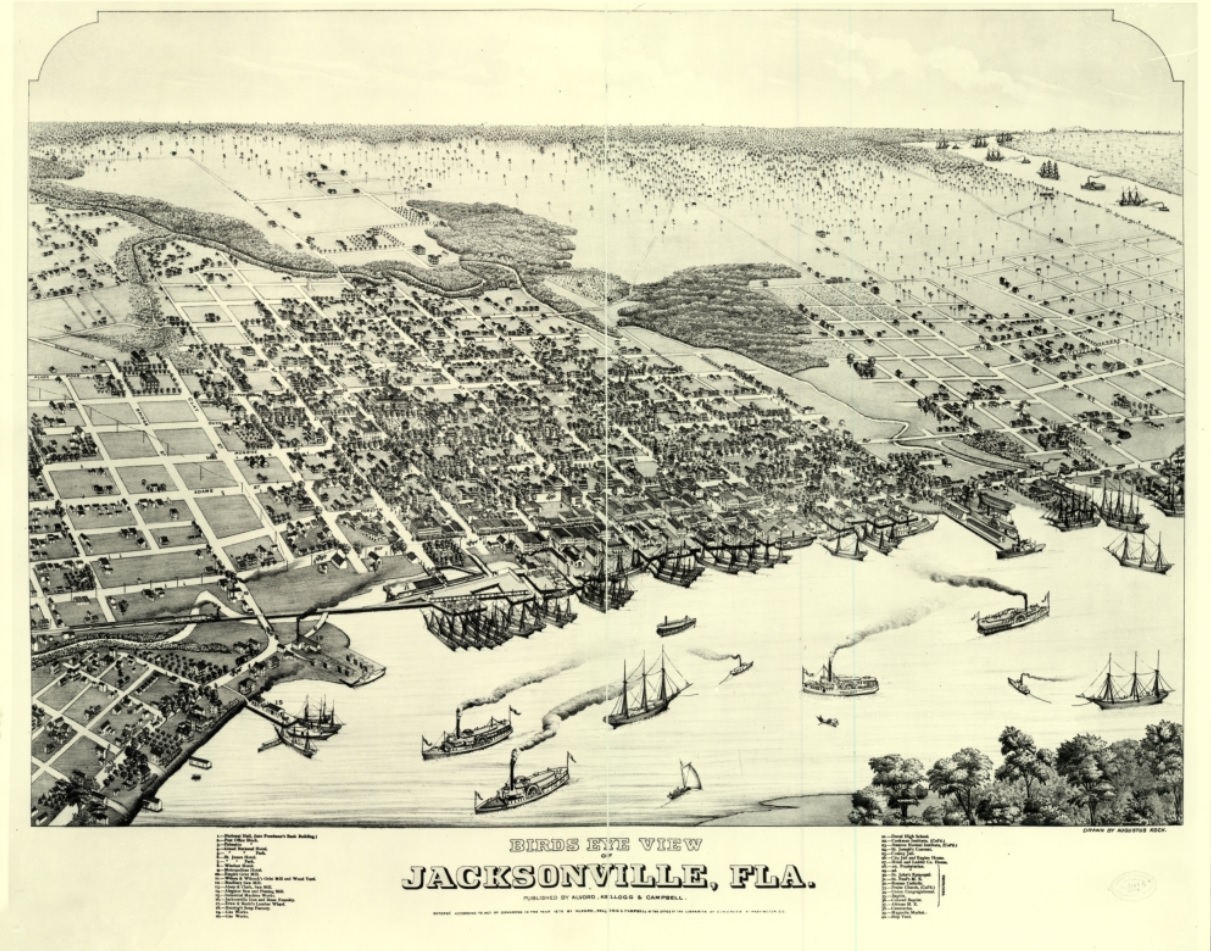
Bird's-eye View of Jacksonville, drawn by Augustus Koch and published in 1876. The church where Annie and Napoleon Broward were married in 1887 is one of many prominent buildings marked on the map. Click or tap the image to view a zoomable version of the map.
This was the height of Napoleon Broward’s career as a businessman. In addition to a very successful freight and passenger business aboard the Kate Spencer, he also had a wood yard and a small grist mill adding to his coffers. He also had the love of a growing family—something that must have meant a great deal to someone who had experienced so much loss. Between 1889 and 1910 the Browards had nine children—eight daughters and a son, named Napoleon after his father.
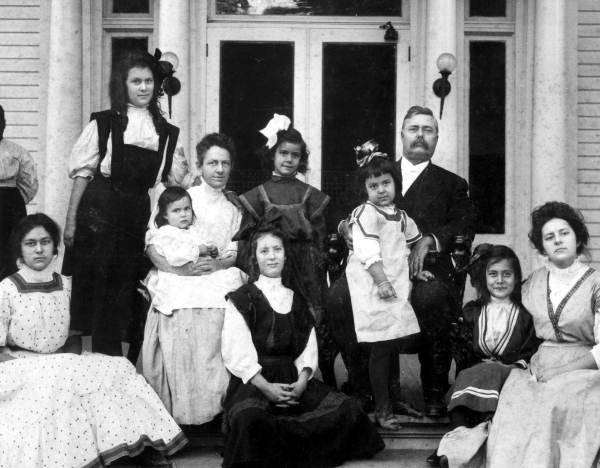
Governor Broward with his family on the steps of Florida's newly-built Governor's Mansion in Tallahassee. The Browards were the first family to occupy the new building. Elizabeth Broward, who is shown seated on her mother's lap, was the first child ever born to an incumbent governor of Florida.
Broward made his first foray into politics in 1888 when Governor Edward Aylesworth Perry appointed him to finish out the term of Duval County Sheriff Henry D. Holland, who had resigned. Broward quickly made a name for himself as an enemy of illegal gambling and was poised to be elected sheriff in his own right later that year. Duval County politics was turned on its head, however, when yellow fever broke out in Jacksonville that spring and huge swaths of the population fled the city. It was middle and upper-class white families who had the money and connections to leave, meaning a huge chunk of the conservative Democratic electorate was absent when election time rolled around in November. Jacksonville’s African American population, solidly Republican in those days, were barred from the refugee camps set up outside the city, and they generally lacked the resources to travel farther away on their own. Under these circumstances, the Republican vote was unusually heavy in Duval that year and that party’s candidates generally won their races. Incumbent officials at both state and county levels were almost all Democrats, however, and they managed to use technicalities to invalidate these victories. Since these machinations left the sheriff’s office “vacant,” the newly-installed Governor Francis P. Fleming was pleased to reappoint Napoleon Broward to the post, despite the fact he had just lost the election. The new sheriff then went on to win reelection in 1892 and 1896.
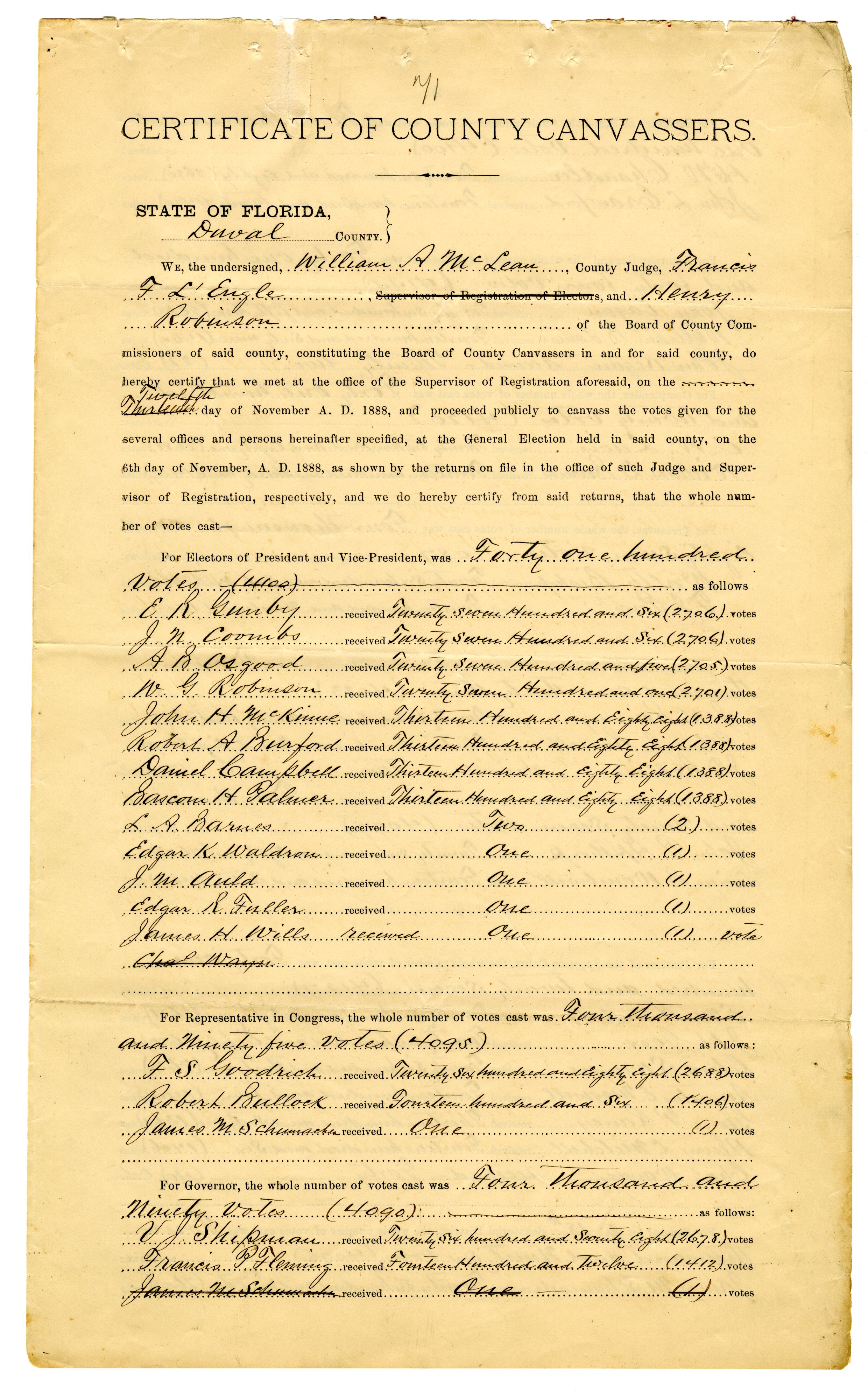
Certificate of County Canvassers for the 1888 General Election in Duval County, November 12, 1888, in Box 3, Folder 1 of Election Return Canvasses, 1865-2004 (Series S1258), State Archives of Florida. Click the image to view the complete document.
Between these political escapades and the many odd jobs of his youth, then, Napoleon had amassed quite an unusual résumé by the mid-1890s. One more peculiar occupation would come his way, however, before he would take a truly deep dive into state-level politics. In 1895, Broward, his brother Montcalm, and George A. DeCottes of Jacksonville formed a partnership and began constructing an ocean-going tugboat they called The Three Friends. They intended to get involved in the lucrative towing and wrecking business in the Florida Keys, but around that same time a tantalizing new opportunity came to their attention. Cuba, located a mere 90 miles south of Key West, was in the throes of revolution as native Cuban rebels attempted to overthrow the Spanish colonial authorities. Cuban refugees up and down the Florida coast were looking for help securing supplies, arms and volunteers to use in the fight.
Getting involved in the Cuban revolt was risky. The United States was still neutral at this point, and any American vessel aiding the Cuban rebels was liable to be seized by Spanish or U.S. authorities. Nonetheless, the owners of The Three Friends signed a contract to transport guns, men and supplies to Cuba. Their motives? Broward later wrote that he and his companions were inspired by the Cuban rebels’ desire to set Cuba free from “oppression and corrupt rule” at the hands of the Spanish. “We, who have breathed the air of liberty for over one hundred years,” he explained, “could not do otherwise than to say to these Cubans in their present effort to throw off the Spanish yoke, ‘God-speed.’” No doubt the pay for this sort of venture was a motivating factor as well, not to mention the adventure of a real filibustering expedition.
The Three Friends returned from its first trip to Cuba in March 1896, making headlines across the nation. Newspapers devoted a sea of ink to describing how Captain Broward and his crew had successfully deposited a cargo for the Cuban rebels while under fire and then escaped from a Spanish vessel on patrol. This ended up being only the first of several filibustering trips between Jacksonville and Cuba for The Three Friends. U.S. authorities knew what Broward was up to, but by the time they had a solid case against him the United States was at war with Spain and prosecutors decided the drop the matter. Broward was free to enjoy the profits of his adventurous expeditions and the widespread notoriety they gained for him.
In 1900, Broward ran successfully for a seat in Florida’s House of Representatives, but it wasn’t long before he set his sights on a higher office—the governorship. Where some candidates might have seen a checkered career like Broward’s as a political liability, Broward made the most of it. His primary opponent in the race was Robert Wyche Davis of Palatka, a well-educated attorney who had been a speaker of the Florida House of Representatives in 1885 and a Congressman for Florida’s Second District since 1897. Davis’ well-heeled manner appealed to middle- and upper-class voters, but Broward’s filibustering fame and folksy demeanor won the approval of rural voters, who showed up in droves to the polls. It didn’t hurt that Broward published an autobiographical pamphlet during the campaign that not only acknowledged but celebrated the winding, twisting story of his youth and early career. For many everyday Floridians, Napoleon Bonaparte Broward was one of them—someone who had known loss and adversity but had worked hard to overcome the challenges life threw at him. That sentiment helped propel Broward to victory over his opponents in the Democratic primary, which in those days was tantamount to winning the whole election. In January 1905, he was sworn in as the 19th governor of the State of Florida.
Cite This Article
Chicago Manual of Style
(17th Edition)Florida Memory. "The Unusual Pre-Gubernatorial Career of Governor Broward." Floridiana, 2021. https://www.floridamemory.com/items/show/346221.
MLA
(9th Edition)Florida Memory. "The Unusual Pre-Gubernatorial Career of Governor Broward." Floridiana, 2021, https://www.floridamemory.com/items/show/346221. Accessed February 26, 2026.
APA
(7th Edition)Florida Memory. (2021, May 5). The Unusual Pre-Gubernatorial Career of Governor Broward. Floridiana. Retrieved from https://www.floridamemory.com/items/show/346221

 Listen: The Blues Program
Listen: The Blues Program